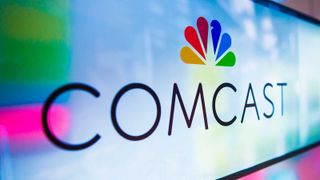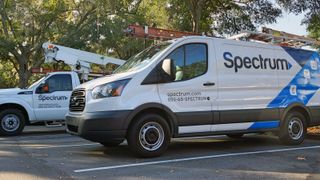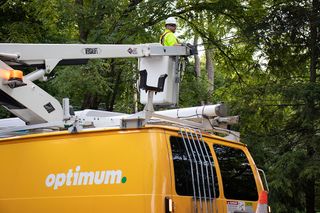Facing Up to COVID-19
Companies throughout the country are grappling with just how to transition their office and field workforces to one that primarily works from home. For the cable business, the dilemma is a little different. How do you transition an employee base that by definition has to interact with customers directly, like field technicians, installers and call center personnel, to one that limits its exposure to customers and other employees?
It’s not easy. And for many cable operators, it is an ongoing process.
Part of the difficulty is that perhaps one of the biggest moves to allow all Americans to work from home -- having access to high-speed internet service -- requires that cable companies send out even more field employees to install service.
And then there are the thousands of call center workers that are fielding calls for new service, service disruptions and outages, some in cramped quarters within spitting distance of other employees who may or may not be tainted with the coronavirus.
While many businesses have sent their employees to work from home because of state and federal orders to contain the spread of COVID-19, many cable call center workers and techs are allowed to go into the office because they are classified as providing an “essential” service. While typically that means police, fire and medical workers, it applies to some cable employees because without broadband, the increasingly creaky economy would grind to a halt.
Practically every cable operator in the country is offering some form of free broadband service to low-income homes with school age children for up to 60 days. So far, that program seems to be catching on, with several operators saying that they have seen a big uptick in installations after “shelter-in-place” orders became commonplace over the past few weeks across the country. In addition, consumers that have lower tiers of broadband service are realizing that the bandwidth isn’t enough, and many are upgrading to higher speeds. That also requires an additional truck roll. And an additional face-to-face encounter.
At Comcast, the country’s largest cable operator is asking every employee who can work from home to do so. Already it has transitioned thousands of call center workers, setting them up with laptops and other necessary equipment so they can perform their jobs without having to come into the office. For positions where working from home is impossible -- like field techs -- Comcast is offering financial incentives and is implementing stringent safety procedures like temperature checks, performing as much work outside the home as possible and distributing self-install kits to customers that have requested to be set up with new service.
Multichannel Newsletter
The smarter way to stay on top of the multichannel video marketplace. Sign up below.
Complete coverage of COVID-19 hitting the TV industry
“We are at a time when our customers need us more than ever and protecting everyone’s safety is absolutely critical,” Comcast said in a statement. “We’ve asked every employee that is able to work from home, to do so, in every office across the country. Our employees are vital to ensuring our customers continue to have access to the internet and other services they need to stay connected now more than ever. In addition, we have been transitioning thousands of customer service representatives across the country to work from home. We have teams working around the clock to help our call center teams make this transition to work from home while continuing to support our customers.”

Comcast Cable has about 88,000 employees serving 31.5 million video, voice and data customers across the country, according to its most recent annual report. The company said it is converting thousands of employees each day to work from home whenever possible.
One Comcast tech has already died from COVID-19, an unidentified 34-year veteran of the company who worked in Fairfield, N.J. Comcast said the employee made several home visits in the Fairfield area between March 3 and March 6, and though there is no evidence any of his customers tested positive for COVID-19, the company and the city are working together to identify any potential victims and determine their status.
“We are deeply saddened to confirm that our technician in Fairfield, NJ has passed away after being diagnosed with COVID-19,” Comcast said in a statement. “Our thoughts and prayers are with his family at this difficult time. He’s been a valued member of our Comcast family for 34 years, and he will be deeply missed.”
From the March 23 MCN: Media Business Preps For New Normal
In a Securities and Exchange Commission filing Tuesday (March 24), Comcast noted that COVID-19 is expected to have a broad impact on the company -- especially on its NBCUniversal unit since the 2020 Summer Olympics have been postponed for a year. On the cable side, Comcast said although its network is meeting the challenge as more customers work and learn from home, the economic stress placed on consumers and businesses because of the virus will likely impact its business as well.
“We expect that the ultimate significance of the impact of COVID-19 on our businesses will vary but will generally depend on the extent of governmental measures affecting day to day life and the length of time that such measures remain in place to respond to COVID-19,” Comcast said in the filing. “At this point, it is impossible to predict such extent and duration and the degree to which supply and demand for our products and services, including advertising, will be affected. This uncertainty makes it challenging for management to estimate the future performance of our businesses, particularly over the near to medium term. However, the impact of COVID-19 could have a material adverse impact on our results of operations over the near to medium term.”
Charter Communications has about 95,000 employees serving 29 million customer relationships in 41 states. The company said it has seen service installation truck rolls increase significantly from their average of about 12,000 per day after announcing its 60-day free access for low-income homes with school-age children. In a March 20 memo to employees, Charter said it is currently fielding more than 50,000 requests for internet service per day. Truck rolls for service repairs have risen to about 30,000 per day, Charter said in the memo. And call center employees have seen the number of calls they receive double over the past few weeks. In the March 20 memo, Charter said that its inbound sales and retention teams fielded more than 200,000 calls in three days.

“Technicians, specialists, agents and co-workers around the country are stepping up and covering peer shifts to allow others time to make personal arrangements they need during these extraordinary times,” Charter said in the memo. “Thousands of hours of overtime are willingly being worked to build and maintain our customer service. We are taking care of our community.”
In addition, Charter said Wednesday that it will no longer do professional installations where self-install is available.
“Self-install is available in most of our markets and provides another way we can minimize in-home interactions but continue to provide the essential connectivity services that are needed,” the company said.
Related: Charter Expands Free Broadband Eligibility
But according to some reports, Charter call center workers in Ohio and other locations were forced to work in tight cubicles less than 5-feet from their neighbor on floors with hundreds of other employees. Those reports added that workers were forced to use sick-leave if they exhibited symptoms and that in some locations field techs shared desks to maintain 24/7 customer support.
According to people familiar with the situation, a lot of these complaints occurred shortly after the mandates for working from home came down, while Charter and other operators were trying to determine the logistics of shifting those employees to working remotely. Since then many of those problems have been addressed.
One of the biggest challenges in shifting call center employees to work-from-home status is ensuring that the customer data they are privy to remains secure. For that reason, most operators have to maintain some presence at their call centers, but they are taking the necessary precautions to ensure that employees are practicing social distancing and following other CDC safety guidelines.
“We are providing all employees an additional 15 days paid time off, to be used for any COVID-19-related personal need,” Charter said in a statement. “We are developing and implementing increased social distancing plans in our call centers and operations facilities. And we will provide the option for remote work to employees whose jobs allow them to work outside the office without endangering our obligation to provide critical services.”
“As one of FEMA’s Community Lifeline sectors, our services are essential,” Charter continued. “We are working around the clock to deliver uninterrupted internet, telephone and TV news services to our 29 million customers including critical institutions like hospitals, first responders and government facilities. During this time, continuing to maintain our operations, while applying the latest CDC guidelines, ensures we provide these vital communications which help flatten the curve and protect the country.”
People familiar with the company said that Charter management has insisted that any employee that is sick or is caring for a sick person remains at home, is educating staff regarding best practices according to CDC health and safety guidelines, staggering shifts and break schedules to limit the number of employees gathering in break rooms and cafeterias, using online chat to assist call center workers with customer escalations and coaching and have halted in-person desk-side consultations. In addition, those people said that employees that do not take advantage of the increased sick days will receive compensation for the days they do not use at the end of the year.
Altice USA, which has 10,700 employees servicing 4.9 million customer relationships, said in a statement that its immediate focus is on the safety of its employees, customers and communities and starts with awareness and ensuring the workforce has the proper information and guidance.

“We are keeping our staff up-to-date on the latest protocols from the relevant health and government agencies to promote wellbeing and healthy habits among our employees and their families,” the company said. “As always, we encourage sick staff members to stay home. We have limited travel for our employees and continue to reinforce safe behavior in every environment – from customer homes and businesses to our stores and offices, where we have ramped up cleaning.”
Altice USA also said it has restricted employee travel, postponed large-scale events, limited the size of meetings and provided remote-work solutions. It also continues to enforce safe behavior in all environments, including customer homes, businesses, and its own stores and offices where it has ramped up deep-cleaning.
Programming: Games are Gone But Sports Nets Go On
In addition, Altice USA said it is partnering with manufacturers to source as many sanitizers and protective supplies as possible and are prioritizing distribution to our customer-facing locations, and has protocols in place that activate closures, disinfection and appropriate quarantine procedures based on recommendations by government and health agencies.
Altice also asked for help from customers, urging those customers that are experiencing flu-like symptoms with service appointments to let customer care personnel know so alternative means of solving the problem can be discussed.

Cox Communications, which has about 20,000 employees servicing 6 million customers, said that 2 ½ weeks ago fewer than 15% of its call center employees were working remotely. By the end of this week (March 27), the company estimates that more than 92% of call center workers will be performing their jobs from home.
Cox said the key challenges in shifting to a remote workforce is ensuring that phones were getting the correct power source, maintaining quality by using physical phones instead of “softphones,” formatting each computer for appropriate security, and boxing up computers, monitors and phones with the right cabling and making sure they were connected properly in the agent’s home workspace.
“For the people who have to work on site we practice social distancing by ensuring people have adequate (>6ft) of space between them, moving to virtual training and coaching, providing hand gel and wipes for each person,” Cox said.
At Atlantic Broadband, 100% of its call center team members -- all local residents of the communities they serve, the company notes -- are working remotely from home. The company also closed its front counters on March 18 and informed customers of easy online payment options to eliminate the need for them to travel to office locations.
Atlantic Broadband also has deployed remote support tools that allow customer care agents and technicians to assist customers in real time via a live, interactive video streaming without the need for an in-home appointment. The company also has deployed self-install options to reduce the need for in-home tech support. In the event an in-home visit is necessary, agents are calling ahead before appointments to assess the wellness situation in the household, and are re-confirming at the door if inside work is required.
“We are facing a new reality in which we must adjust our operational practices in the wake of the COVID-19 virus, even as we find new ways to serve our customers,” Atlantic Broadband president Frank van der Post said in a press release. “With the goal of protecting our team members and our customers, and reducing the spread of the COVID-19 virus in our communities, we have implemented a range of measures that will significantly reduce the need to enter customers’ homes, while continuing to provide the vital connections our customers need at this time.”
